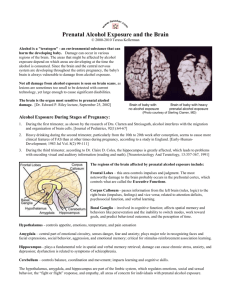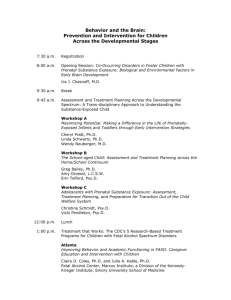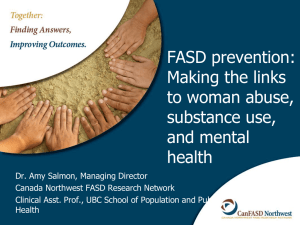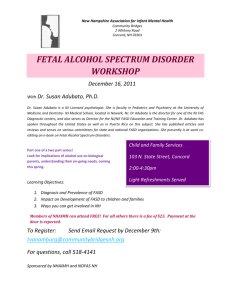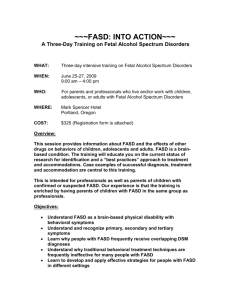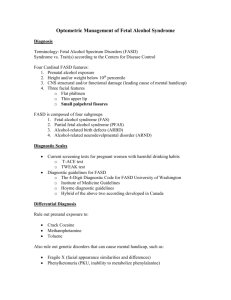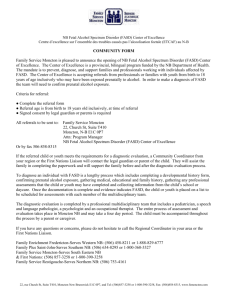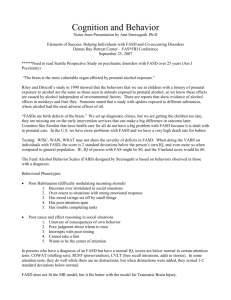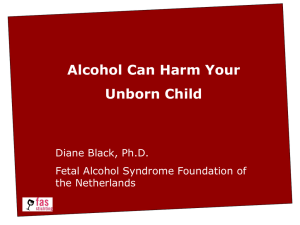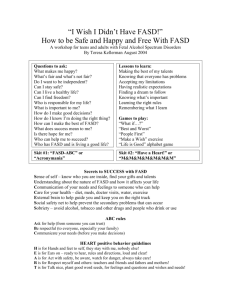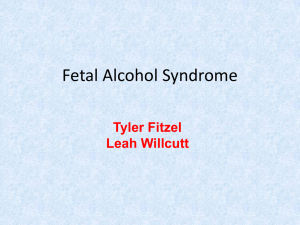Prenatal Alcohol Exposure and the Brain
advertisement
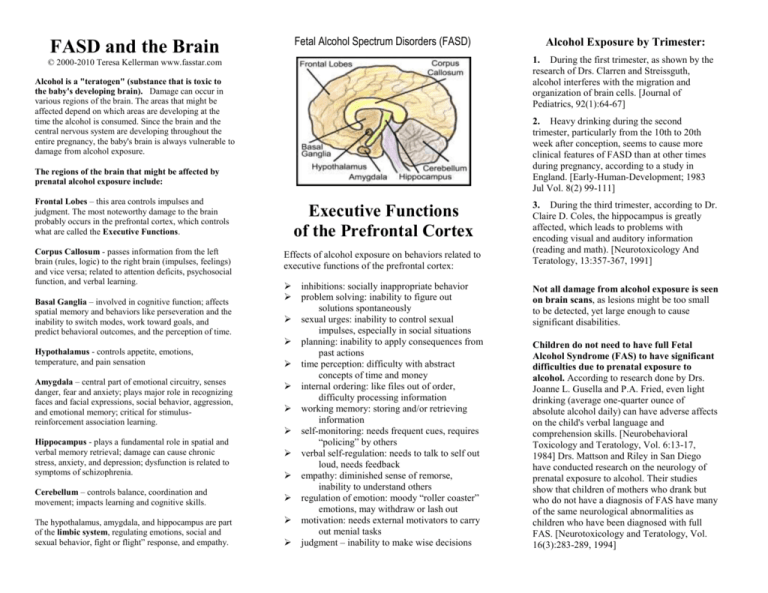
Fetal Alcohol Spectrum Disorders (FASD) FASD and the Brain 1. During the first trimester, as shown by the research of Drs. Clarren and Streissguth, alcohol interferes with the migration and organization of brain cells. [Journal of Pediatrics, 92(1):64-67] © 2000-2010 Teresa Kellerman www.fasstar.com Alcohol is a "teratogen" (substance that is toxic to the baby's developing brain). Damage can occur in various regions of the brain. The areas that might be affected depend on which areas are developing at the time the alcohol is consumed. Since the brain and the central nervous system are developing throughout the entire pregnancy, the baby's brain is always vulnerable to damage from alcohol exposure. 2. Heavy drinking during the second trimester, particularly from the 10th to 20th week after conception, seems to cause more clinical features of FASD than at other times during pregnancy, according to a study in England. [Early-Human-Development; 1983 Jul Vol. 8(2) 99-111] The regions of the brain that might be affected by prenatal alcohol exposure include: Frontal Lobes – this area controls impulses and judgment. The most noteworthy damage to the brain probably occurs in the prefrontal cortex, which controls what are called the Executive Functions. Corpus Callosum - passes information from the left brain (rules, logic) to the right brain (impulses, feelings) and vice versa; related to attention deficits, psychosocial function, and verbal learning. Basal Ganglia – involved in cognitive function; affects spatial memory and behaviors like perseveration and the inability to switch modes, work toward goals, and predict behavioral outcomes, and the perception of time. Hypothalamus - controls appetite, emotions, temperature, and pain sensation Amygdala – central part of emotional circuitry, senses danger, fear and anxiety; plays major role in recognizing faces and facial expressions, social behavior, aggression, and emotional memory; critical for stimulusreinforcement association learning. Hippocampus - plays a fundamental role in spatial and verbal memory retrieval; damage can cause chronic stress, anxiety, and depression; dysfunction is related to symptoms of schizophrenia. Cerebellum – controls balance, coordination and movement; impacts learning and cognitive skills. The hypothalamus, amygdala, and hippocampus are part of the limbic system, regulating emotions, social and sexual behavior, fight or flight” response, and empathy. Alcohol Exposure by Trimester: Executive Functions of the Prefrontal Cortex Effects of alcohol exposure on behaviors related to executive functions of the prefrontal cortex: inhibitions: socially inappropriate behavior problem solving: inability to figure out solutions spontaneously sexual urges: inability to control sexual impulses, especially in social situations planning: inability to apply consequences from past actions time perception: difficulty with abstract concepts of time and money internal ordering: like files out of order, difficulty processing information working memory: storing and/or retrieving information self-monitoring: needs frequent cues, requires “policing” by others verbal self-regulation: needs to talk to self out loud, needs feedback empathy: diminished sense of remorse, inability to understand others regulation of emotion: moody “roller coaster” emotions, may withdraw or lash out motivation: needs external motivators to carry out menial tasks judgment – inability to make wise decisions 3. During the third trimester, according to Dr. Claire D. Coles, the hippocampus is greatly affected, which leads to problems with encoding visual and auditory information (reading and math). [Neurotoxicology And Teratology, 13:357-367, 1991] Not all damage from alcohol exposure is seen on brain scans, as lesions might be too small to be detected, yet large enough to cause significant disabilities. Children do not need to have full Fetal Alcohol Syndrome (FAS) to have significant difficulties due to prenatal exposure to alcohol. According to research done by Drs. Joanne L. Gusella and P.A. Fried, even light drinking (average one-quarter ounce of absolute alcohol daily) can have adverse affects on the child's verbal language and comprehension skills. [Neurobehavioral Toxicology and Teratology, Vol. 6:13-17, 1984] Drs. Mattson and Riley in San Diego have conducted research on the neurology of prenatal exposure to alcohol. Their studies show that children of mothers who drank but who do not have a diagnosis of FAS have many of the same neurological abnormalities as children who have been diagnosed with full FAS. [Neurotoxicology and Teratology, Vol. 16(3):283-289, 1994] The brain is the organ most sensitive to prenatal alcohol damage. [Dr. Edward P. Riley lecture, September 25, 2002] Damage to the brain from alcohol exposure can have an adverse affect on behavior. Alcohol exposure appears to damage some parts of the brain, while leaving other parts unaffected. Some children exposed to alcohol will have neurological problems in just a few brain areas. Other exposed children may have problems in several brain areas. The brain dysfunction is expressed in the form of inappropriate behaviors. Their behavior problems should be viewed with respect to neurological dysfunction. Although psychological factors such as abuse and neglect can exacerbate behavior problems in FASD, we are looking primarily at behavior that is organic in origin. To better understand FASD behavior issues, shift perspective from thinking the child "won't" to "can't." (Diane Malbin, MSW, Trying Differently Rather Than Harder, ) Sometimes the person's behavior is misinterpreted as willful misconduct (Debra Evensen, www.fasalaska.com), but for the most part, maintaining good behavior is outside of the child's control, especially in stressful or stimulating situations. Behavior problems in children with FASD are often blamed on poor parenting skills. While good parenting skills are required, even alcohol exposed children raised in stable, healthy homes can exhibit unruly behavior. The most difficult behaviors are seen in children who were prenatally exposed to alcohol and who also suffer from Reactive Attachment Disorder. Most children with FASD have some attachment issues, may display inappropriate sexual behaviors, show poor judgment, have difficulty controlling their impulses, are emotionally immature, and need frequent reminders of rules. As a result, many will require the protection of close supervision for the rest of their lives. © 2000-2010 Teresa Kellerman www.fasstar.com Fetal Alcohol Spectrum Disorders (FASD) Alcohol causes more damage to the developing fetus than any other substance, including marijuana, heroin, and cocaine. (Institute of Medicine, 1996) “Soft Signs” FASD and the Brain (Psychological signs of FASD brain damage) Immature social development: overly friendly to strangers Emotional lability: Poorly developed conscience: Lack of consistent impulse control: Inability to learn from consequences Good expressive language skills Talented in art, music or mechanics. Attention deficits: not always hyperactive, but easily distracted by external stimuli Short-term memory deficits Inappropriate social interactions Difficulty managing money: Poor concept of time Grandiose ideas and unrealistic life goals, distorted perceptions Poor judgment Vulnerability and naiveté “The greatest obstacle our children with fetal alcohol disorders must overcome is chronic frustration from not being able to meet the unrealistic expectations of others.” – Dr. Calvin Sumner, nationally recognized expert. Fasstar Information Series Brochure 0310B (Photo courtesy of Sterling Clarren, MD) Brain of a baby with no alcohol exposure Brain of baby with heavy alcohol exposure How Prenatal Alcohol Exposure Affects Development of the Brain By Teresa Kellerman Fasstar Enterprises Tucson, AZ 85711 520-296-9172 www.fasstar.com
